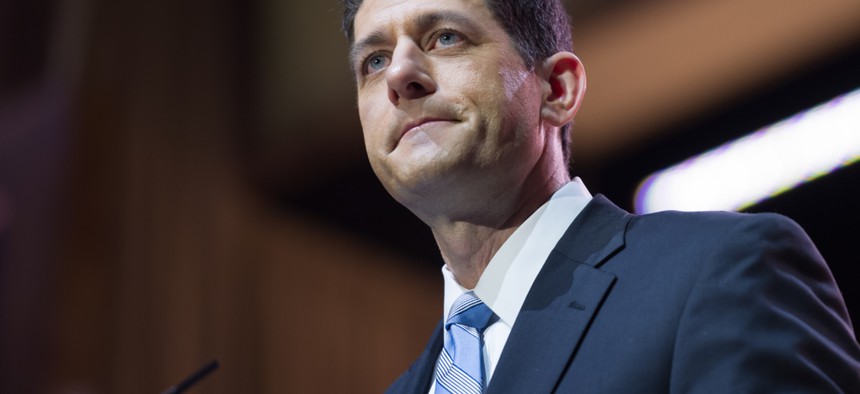
Christopher Halloran / Shutterstock.com
Paul Ryan Won't Run for President in 2016
Republican cites work on House Ways and Means Committee as needing his full attention.
Paul Ryan, the Republican Party's vice-presidential nominee in 2012, announced Monday that he will not run for the White House in 2016.
"After giving it a lot of thought, I've decided not to run for president," Ryan said in a statement from his campaign office. "Our work at the House Ways and Means Committee over the next few years will be crucial to moving America forward, and my job as Chairman deserves undivided attention."
Ryan's decision was first reported by NBC News.
Ryan on Monday spoke with some major donors to Mitt Romney, his 2012 running mate, to inform them personally that he would not run in 2016, according to one bundler who spoke with Ryan.
The former vice-presidential nominee's decision to bypass the 2016 campaign is not surprising. In a series of interviews last year for a National Journal cover story, Ryan hinted at a plan to serve three more terms in Congress—and then exit the political arena once and for all.
"I want to be an impactful member of Congress. I want to make a big difference. But then I want to leave and go do something else," Ryan said then. "I want to be young enough where I can go do something else with my life."
Of course, Ryan has not ruled out running for president down the line. But it became increasingly clear after his turn on the national stage in 2012 that he wouldn't be seeking an encore. Ryan is protective of his tight-knit extended family in Janesville, Wis., and was not eager to expose them to another grueling, invasive national campaign.
Ryan also fancies himself a policy expert more than a politician—and frequently found himself frustrated with the ephemeral nature of presidential politicking.
"I did 220-some TV interviews where every local reporter wants to make their name because they stumped you," Ryan said in the National Journal story.
That experience, though rewarding in some aspects, convinced Ryan—and his family—that he would be happier in the House of Representatives. Making that option all the more appealing was Ryan's opportunity to take over the House Ways and Means Committee—one of the most powerful panels in Congress, and the position Ryan described to friends as his "dream job."
Tobin Ryan, Paul's older brother, had told National Journal that Paul would look to impact the upcoming presidential race with his policy ideas instead of his own candidacy.
"It's a question of, how do you get his ideas front and center? Do you have to throw yourself into the 2016 mix to get those ideas across? That's a big price to pay," Tobin said. He later added: "From my vantage point, maybe chairing Ways and Means gives him that ability, without throwing himself into a campaign, to get those ideas front and center. That's more his style, and that's probably the way...."
Still, even as Ryan's decision is not unexpected, it marks an astounding change in career trajectory.
After being elected to Congress at just 28 years old, Ryan quickly distinguished himself as an aggressive policy mind. His proposal to privatize Social Security made plenty of enemies—even within his own party—during the George W. Bush years. Then, after Barack Obama became president, Ryan's star reached another stratosphere with the release of highly controversial budget proposals that balanced the federal budget by slashing safety-net programs.
Ryan was a bona fide conservative icon by the time the 2012 presidential cycle began—and as such, received enormous pressure to run. Conservative writers and intellectuals considered him the savior of the Republican Party, and his allies in the GOP establishment figured he was their presidential candidate of the future. But he ultimately refused to enter the 2012 race, explaining that he prefers policy work to political campaigning.
When he accepted Romney's offer to join the Republican ticket in 2012, Ryan told friends and family members that he did so out of a sense of duty. But even that experience on the national stage—and the "next in line" status it conferred upon him—was not enough to shake Ryan's belief that his talents are best utilized in Congress.
"I know myself very well, and I know where I'm happy," Ryan told National Journal. "I like spending my time on policymaking."
Now that he's officially out of the running for 2016, Ryan's endorsement will be among the Republican Party's most coveted. His allies have predicted that he would end up endorsing either Wisconsin Gov. Scott Walker, a longtime friend, or Sen. Marco Rubio of Florida, a like-minded policy thinker.
But all bets are off now that Romney is actively considering a third run for the presidency—a scenario Ryan dismissed only a few months ago.
"I'd get behind Mitt. But he's not going to run," Ryan said at the time. "He has zero plans of doing that."
Shane Goldmacher contributed to this article.
(Image via Christopher Halloran / Shutterstock.com)






